formerly eScholarship Editions


|
|
|
|
Your request for similar items found 20 book(s). | Modify Search | Displaying 1 - 20 of 20 book(s) | |
| 1. | 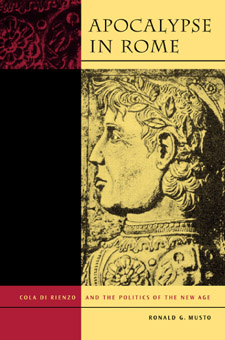 | Title: Apocalypse in Rome: Cola di Rienzo and the politics of the New Age Author: Musto, Ronald G Published: University of California Press, 2003 Subjects: History | European Studies | Medieval History | Medieval Studies | Autobiographies and Biographies | Classical Politics | Autobiographies and Biographies Publisher's Description: On May 20, 1347, Cola di Rienzo overthrew without violence the turbulent rule of Rome's barons and the absentee popes. A young visionary and the best political speaker of his time, Cola promised Rome a return to its former greatness. Ronald G. Musto's vivid biography of this charismatic leader - whose exploits have enlivened the work of poets, composers, and dramatists, as well as historians - peels away centuries of interpretation to reveal the realities of fourteenth-century Italy and to offer a comprehensive account of Cola's rise and fall. A man of modest origins, Cola gained a reputation as a talented professional with an unparalleled knowledge of Rome's classical remains. After earning the respect and friendship of Petrarch and the sponsorship of Pope Clement VI, Cola won the affections and loyalties of all classes of Romans. His buono stato established the reputation of Rome as the heralded New Jerusalem of the Apocalypse and quickly made the city a potent diplomatic and religious center that challenged the authority - and power - of both pope and emperor. At the height of Cola's rule, a conspiracy of pope and barons forced him to flee the city and live for years as a fugitive until he was betrayed and taken to Avignon to stand trial as a heretic. Musto relates the dramatic story of Cola's subsequent exoneration and return to central Italy as an agent of the new pope. But only weeks after he reestablished his government, he was slain by the Romans atop the Capitoline hill. In his exploration, Musto examines every known document pertaining to Cola's life, including papal, private, and diplomatic correspondence rarely used by earlier historians. With his intimate knowledge of historical Rome - its streets and ruins, its churches and palaces, from the busy Tiber riverfront to the lost splendor of the Capitoline - he brings a cinematic flair to this fascinating historical narrative. [brief] Similar Items |
| 2. | 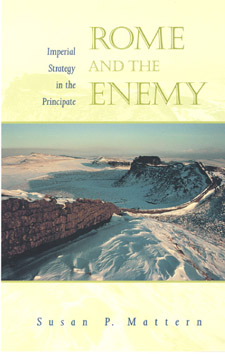 | Title: Rome and the enemy: imperial strategy in the principate Author: Mattern, Susan P 1966- Published: University of California Press, 1999 Subjects: Classics | Classical History | Classical Politics | Classical Literature and Language | Military History | Ancient History Publisher's Description: How did the Romans build and maintain one of the most powerful and stable empires in the history of the world? This illuminating book draws on the literature, especially the historiography, composed by the members of the elite who conducted Roman foreign affairs. From this evidence, Susan P. Mattern reevaluates the roots, motivations, and goals of Roman imperial foreign policy especially as that policy related to warfare. In a major reinterpretation of the sources, Rome and the Enemy shows that concepts of national honor, fierce competition for status, and revenge drove Roman foreign policy, and though different from the highly rationalizing strategies often attributed to the Romans, dictated patterns of response that remained consistent over centuries. Mattern reconstructs the world view of the Roman decision-makers, the emperors, and the elite from which they drew their advisers. She discusses Roman conceptions of geography, strategy, economics, and the influence of traditional Roman values on the conduct of military campaigns. She shows that these leaders were more strongly influenced by a traditional, stereotyped perception of the enemy and a drive to avenge insults to their national honor than by concepts of defensible borders. In fact, the desire to enforce an image of Roman power was a major policy goal behind many of their most brutal and aggressive campaigns. Rome and the Enemy provides a fascinating look into the Roman mind in addition to a compelling reexamination of Roman conceptions of warfare and national honor. The resulting picture creates a new understanding of Rome's long mastery of the Mediterranean world. [brief] Similar Items |
| 3. | 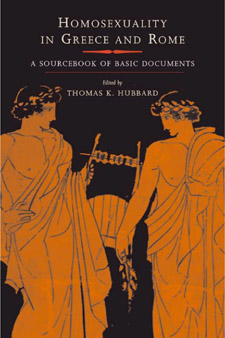 | Title: Homosexuality in Greece and Rome: a sourcebook of basic documents Author: Hubbard, Thomas K Published: University of California Press, 2003 Subjects: Gender Studies | Classics | GayLesbian and Bisexual Studies Publisher's Description: The most important primary texts on homosexuality in ancient Greece and Rome are translated into modern, explicit English and collected together for the first time in this comprehensive sourcebook. Covering an extensive period - from the earliest Greek texts in the late seventh century b.c.e. to Greco-Roman texts of the third and fourth centuries c.e. - the volume includes well-known writings by Plato, Sappho, Aeschines, Catullus, and Juvenal, as well as less well known but highly relevant and intriguing texts such as graffiti, comic fragments, magical papyri, medical treatises, and selected artistic evidence. These fluently translated texts, together with Thomas K. Hubbard's valuable introductions, clearly show that there was in fact no more consensus about homosexuality in ancient Greece and Rome than there is today. The material is organized by period and by genre, allowing readers to consider chronological developments in both Greece and Rome. Individual texts each are presented with a short introduction contextualizing them by date and, where necessary, discussing their place within a larger work. Chapter introductions discuss questions of genre and the ideological significance of the texts, while Hubbard's general introduction to the volume addresses issues such as sexual orientation in antiquity, moral judgments, class and ideology, and lesbianism. With its broad, unexpurgated, and thoroughly informed presentation, this unique anthology gives an essential perspective on homosexuality in classical antiquity. [brief] Similar Items |
| 4. | 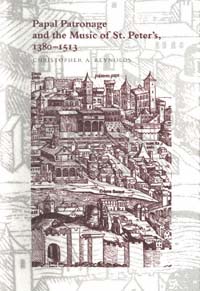 | Title: Papal patronage and the music of St. Peter's, 1380-1513 Author: Reynolds, Christopher A Published: University of California Press, 1996 Subjects: Music | Musicology | European History Publisher's Description: A new picture of music at the basilica of St. Peter's in the fifteenth century emerges in Christopher A. Reynolds's fascinating chronicle of this rich period of Italian musical history. Reynolds examines archival documents, musical styles, and issues of artistic patronage and cultural context in a fertile consideration of the ways historical and musical currents affected each other.This work is both a historical account of performers and composers and an examination of how their music revealed their cultural values and educational backgrounds. Reynolds analyzes several anonymous masses copied at St. Peter's, proposing attributions that have biographical implications for the composers. Taken together, the archival records and the music sung at St. Peter's reveal a much clearer picture of musical life at the basilica than either source would alone. The contents of the St. Peter's choirbook help document musical life as surely as that musical life - insofar as it can be reconstructed from the archives - illumines the choirbook. [brief] Similar Items |
| 5. | 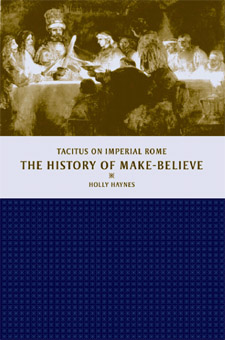 | Title: The history of make-believe: Tacitus on imperial Rome Author: Haynes, Holly Published: University of California Press, 2003 Subjects: Classics | Classical History | Classical Literature and Language | Political Theory | Ancient History Publisher's Description: A theoretically sophisticated and illuminating reading of Tacitus, especially the Histories , this work points to a new understanding of the logic of Roman rule during the early Empire. Tacitus, in Holly Haynes' analysis, does not write about the reality of imperial politics and culture but about the imaginary picture that imperial society makes of these concrete conditions of existence - the "making up and believing" that figure in both the subjective shaping of reality and the objective interpretation of it. Haynes traces Tacitus's development of this fingere/credere dynamic both backward and forward from the crucial year A.D. 69. Using recent theories of ideology, especially within the Marxist and psychoanalytic traditions, she exposes the psychic logic lurking behind the actions and inaction of the protagonists of the Histories . Her work demonstrates how Tacitus offers penetrating insights into the conditions of historical knowledge and into the psychic logic of power and its vicissitudes, from Augustus through the Flavians. By clarifying an explicit acknowledgment of the difficult relationship between res and verba, in the Histories, Haynes shows how Tacitus calls into question the possibility of objective knowing - how he may in fact be the first to allow readers to separate the objectively knowable from the objectively unknowable. Thus, Tacitus appears here as going further toward identifying the object of historical inquiry - and hence toward an "objective" rendering of history - than most historians before or since. [brief] Similar Items |
| 6. | 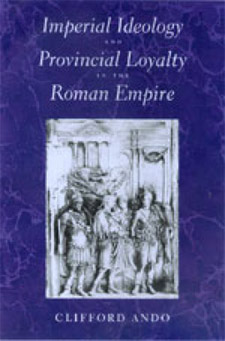 | Title: Imperial ideology and provincial loyalty in the Roman Empire Author: Ando, Clifford 1969- Published: University of California Press, 2000 Subjects: Classics | Classical History | Ancient History | Social Theory Publisher's Description: The Roman empire remains unique. Although Rome claimed to rule the world, it did not. Rather, its uniqueness stems from the culture it created and the loyalty it inspired across an area that stretched from the Tyne to the Euphrates. Moreover, the empire created this culture with a bureaucracy smaller than that of a typical late-twentieth-century research university. In approaching this problem, Clifford Ando does not ask the ever-fashionable question, Why did the Roman empire fall? Rather, he asks, Why did the empire last so long? Imperial Ideology and Provincial Loyalty in the Roman Empire argues that the longevity of the empire rested not on Roman military power but on a gradually realized consensus that Roman rule was justified. This consensus was itself the product of a complex conversation between the central government and its far-flung peripheries. Ando investigates the mechanisms that sustained this conversation, explores its contribution to the legitimation of Roman power, and reveals as its product the provincial absorption of the forms and content of Roman political and legal discourse. Throughout, his sophisticated and subtle reading is informed by current thinking on social formation by theorists such as Max Weber, Jürgen Habermas, and Pierre Bourdieu. [brief] Similar Items |
| 7. | 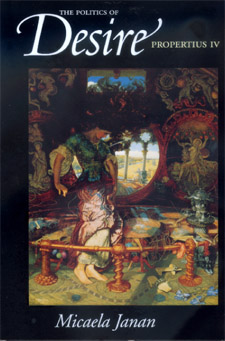 | Title: The politics of desire: Propertius IV Author: Janan, Micaela Wakil Published: University of California Press, 2000 Subjects: Classics | Classical Literature and Language | Poetry Publisher's Description: Propertius (ca. 54 b.c.--ca. 2 b.c.) was a Roman poet who composed four compelling books of elegies in the chaotic years surrounding Rome's transition from republic to empire. The first three of these books revolve mostly around a tormented love affair with a woman called Cynthia. The fourth book of poetry rests on more diverse subject matter and is notoriously the most opaque and elusive. In The Politics of Desire, Micaela Janan radically reassesses Propertius' last elegies, using contemporary psychoanalytic theory to illuminate these challenging texts. Janan finds that the upheaval of Rome's transformation to empire corresponds to the intellectually unsettled conditions of our own time, so that contemporary methodologies offer an uncannily suitable approach for understanding Propertius. In particular, she uses the work of Jacques Lacan, since it provides the best conceptual tools for examining the relation between political crisis and the struggles of the self, a theme that resonates in these difficult elegies. This book expands our understanding of an important Roman poet, and its innovative and sophisticated methodological approach makes a substantial contribution to feminist and psychoanalytic criticism. In addition, Janan addresses elegy's relationship to larger cultural questions, and broadens our understanding of the social crisis affecting Rome during the early empire. [brief] Similar Items |
| 8. | 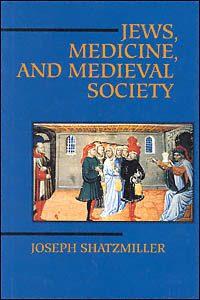 | Title: Jews, medicine, and medieval society Joseph Shatzmiller Author: Shatzmiller, Joseph Published: University of California Press, 1995 Subjects: Jewish Studies | Medieval History | European History | Medieval Studies | Medicine Publisher's Description: Jews were excluded from most professions in medieval, predominantly Christian Europe. Bigotry was widespread, yet Jews were accepted as doctors and surgeons, administering not only to other Jews but to Christians as well. Why did medieval Christians suspend their fear and suspicion of the Jews, allowing them to inspect their bodies, and even, at times, to determine their survival? What was the nature of the doctor-patient relationship? Did the law protect Jewish doctors in disputes over care and treatment?Joseph Shatzmiller explores these and other intriguing questions in the first full social history of the medieval Jewish doctor. Based on extensive archival research in Provence, Spain, and Italy, and a deep reading of the widely scattered literature, Shatzmiller examines the social and economic forces that allowed Jewish medical professionals to survive and thrive in thirteenth- and fourteenth-century Europe. His insights will prove fascinating to scholars and students of Judaica, medieval history, and the history of medicine. [brief] Similar Items |
| 9. | 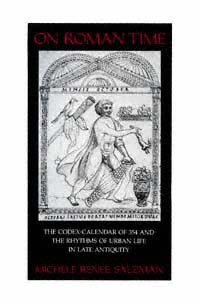 | Title: On Roman time: the codex-calendar of 354 and the rhythms of urban life in late antiquity Author: Salzman, Michele Renee Published: University of California Press, 1991 Subjects: Classics | Religion | Classical History Publisher's Description: Because they list all the public holidays and pagan festivals of the age, calendars provide unique insights into the culture and everyday life of ancient Rome. The Codex-Calendar of 354 miraculously survived the Fall of Rome. Although it was subsequently lost, the copies made in the Renaissance remain invaluable documents of Roman society and religion in the years between Constantine's conversion and the fall of the Western Empire.In this richly illustrated book, Michele Renee Salzman establishes that the traditions of Roman art and literature were still very much alive in the mid-fourth century. Going beyond this analysis of precedents and genre, Salzman also studies the Calendar of 354 as a reflection of the world that produced and used it. Her work reveals the continuing importance of pagan festivals and cults in the Christian era and highlights the rise of a respectable aristocratic Christianity that combined pagan and Christian practices. Salzman stresses the key role of the Christian emperors and imperial institutions in supporting pagan rituals. Such policies of accomodation and assimilation resulted in a gradual and relatively peaceful transformation of Rome from a pagan to a Christian capital. [brief] Similar Items |
| 10. |  | Title: Two churches: England and Italy in the thirteenth century Author: Brentano, Robert 1926- Published: University of California Press, 1988 Subjects: History | European History | Medieval History | Medieval Studies | Religion Similar Items |
| 11. |  | Title: Jewish life in renaissance Italy Author: Bonfil, Roberto Published: University of California Press, 1994 Subjects: Jewish Studies | Renaissance History | European History Publisher's Description: With this heady exploration of time and space, rumors and silence, colors, tastes, and ideas, Robert Bonfil recreates the richness of Jewish life in Renaissance Italy. He also forces us to rethink conventional interpretations of the period, which feature terms like "assimilation" and "acculturation." Questioning the Italians' presumed capacity for tolerance and civility, he points out that Jews were frequently uprooted and persecuted, and where stable communities did grow up, it was because the hostility of the Christian population had somehow been overcome.After the ghetto was imposed in Venice, Rome, and other Italian cities, Jewish settlement became more concentrated. Bonfil claims that the ghetto experience did more to intensify Jewish self-perception in early modern Europe than the supposed acculturation of the Renaissance. He shows how, paradoxically, ghetto living opened and transformed Jewish culture, hastening secularization and modernization.Bonfil's detailed picture reveals in the Italian Jews a sensitivity and self-awareness that took into account every aspect of the larger society. His inside view of a culture flourishing under stress enables us to understand how identity is perceived through constant interplay - on whatever terms - with the Other. [brief] Similar Items |
| 12. |  | Title: How fascism ruled women: Italy, 1922-1945 Author: De Grazia, Victoria Published: University of California Press, 1992 Subjects: History | European History | Women's Studies Publisher's Description: Italy has been made; now we need to make the Italians," goes a familiar Italian saying. Mussolini was the first head of state to include women in this mandate. How the fascist dictatorship defined the place of women in modern Italy and how women experienced the Duce 's rule are the subjects of Victoria de Grazia's new work. De Grazia draws on an array of sources - memoirs and novels, the images, songs, and events of mass culture, as well as government statistics and archival reports. She offers a broad yet detailed characterization of Italian women's ambiguous and ambivalent experience of a regime that promised modernity, yet denied women emancipation.Always attentive to the great diversity among women and careful to distinguish fascist rhetoric from the practices that really shaped daily existence, the author moves with ease from the public discourse about femininity to the images of women in propaganda and commercial culture. She analyzes fascist attempts to organize women and the ways in which Mussolini's intentions were received by women as social actors. The first study of women's experience under Italian fascism, this is also a history of the making of contemporary Italian society. [brief] Similar Items |
| 13. |  | Title: Gasparo Contarini: Venice, Rome, and reform Author: Gleason, Elisabeth G Published: University of California Press, 1993 Subjects: History | Religion | Renaissance History | European History | Christianity Publisher's Description: Gasparo Contarini (1483-1542) was a major protagonist in the Counter-Reformation of the sixteenth century. A worldly Venetian patrician, he later became an ascetic advocate of Church reform and, as a Catholic cardinal, was sent to the important Colloquy of Regensburg. He failed in his mission to bring about an agreement between Lutherans and Catholics; nevertheless, his life and thought, as well as his friendships with the most vocal proponents of concord, peace, and toleration, make him an impressive and significant historical figure.In the first biography of Contarini since 1885, Elisabeth Gleason greatly broadens our understanding of the man and his times. As a result, scholars and students will come to see Cardinal Gasparo Contarini as a reminder of alternative concepts of authority and liberty in both church and state. [brief] Similar Items |
| 14. | 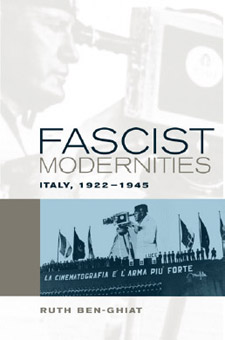 | Title: Fascist modernities: Italy, 1922-1945 Author: Ben-Ghiat, Ruth Published: University of California Press, 2001 Subjects: European Studies | History | Intellectual History | European History Publisher's Description: Ruth Ben-Ghiat's innovative cultural history of Mussolini's dictatorship is a provocative discussion of the meanings of modernity in interwar Italy. Eloquent, pathbreaking, and deft in its use of a broad range of materials, this work argues that fascism appealed to many Italian intellectuals as a new model of modernity that would resolve the contemporary European crisis as well as long-standing problems of the national past. Ben-Ghiat shows that - at a time of fears over the erosion of national and social identities - Mussolini presented fascism as a movement that would allow economic development without harm to social boundaries and national traditions. She demonstrates that although the regime largely failed in its attempts to remake Italians as paragons of a distinctly fascist model of mass society, twenty years of fascism did alter the landscape of Italian cultural life. Among younger intellectuals in particular, the dictatorship left a legacy of practices and attitudes that often continued under different political rubrics after 1945. [brief] Similar Items |
| 15. | 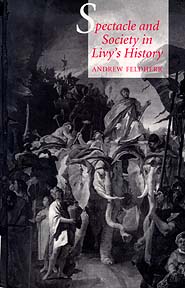 | Title: Spectacle and society in Livy's history Author: Feldherr, Andrew 1963- Published: University of California Press, 1998 Subjects: Classics | Classical Literature and Language | Classical History | Comparative Literature | Literature Publisher's Description: Public spectacle - from the morning rituals of the Roman noble to triumphs and the shows of the Arena - formed a crucial component of the language of power in ancient Rome. The historian Livy (c. 60 B.C.E.-17 C.E.), who provides our fullest description of Rome's early history, presents his account of the growth of the Roman state itself as something to be seen - a visual monument and public spectacle. Through analysis of several episodes in Livy's History , Andrew Feldherr demonstrates the ways in which Livy uses specific visual imagery to make the reader not only an observer of certain key events in Roman history but also a participant in those events. This innovative study incorporates recent literary and cultural theory with detailed historical analysis to put an ancient text into dialogue with contemporary discussions of visual culture.In Spectacle and Society in Livy's History , Feldherr shows how Livy uses the literary representation of spectacles from the Roman past to construct a new sense of civic identity among his readers. He offers a new way of understanding how Livy's technique addressed the political and cultural needs of Roman citizens in Livy's day. In addition to renewing our understanding of Livy through modern scholarship, Feldherr provides a new assessment of the historian's aims and methods by asking what it means for the historian to make readers spectators of history. [brief] Similar Items |
| 16. | 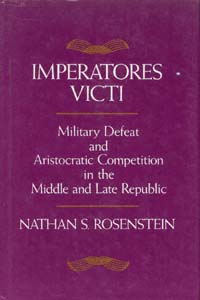 | Title: Imperatores victi: military defeat and aristocratic competition in the middle and late republic Author: Rosenstein, Nathan Stewart Published: University of California Press, 1990 Subjects: Classics | Classical History | Military History | Ancient History Publisher's Description: Given the intense competition among aristocrats seeking public office in the middle and late Roman Republic, one would expect that their persistent struggles for honor, glory, and power could have seriously undermined the state or damaged the cohesiveness of the ruling class. Rome in fact depended on aristocratic competition, since no professional bureaucracy directed public affairs and no salary was attached to any public office. But as Rosenstein adeptly shows, competition appears to have been surprisingly limited, in ways that curtailed the possible destructive effects of all-out contests between individuals. Imperatores Victi examines one particularly striking case of such checks on competition. Military success at all times represented an abundant source of prestige and political strength at Rome. Generals who led armies to victory enjoyed a better-than-average chance of securing higher office upon their return from the field. Yet this study demonstrates that defeated generals were not barred from public office and in fact went on to win the Republic's most highly coveted and hotly contested offices in numbers virtually identical with those of their undefeated peers.Rosenstein explores how this unexpected limit to competition functions, reviewing beliefs about the religious origins of defeat, assumptions about common soldiers' duties in battle, and definitions of honorable behavior of an aristocrat during a crisis. These perspectives were instrumental in shifting the onus of failure away from a general's person and in offering positive strategies a general might use to win glory and respect even in defeat and to silence potential critics among a failed general's peers. Such limits to competition had an impact on the larger problems of stability and coherence in the Republic and its political elite; these larger problems are discussed in the concluding chapter. [brief] Similar Items |
| 17. | 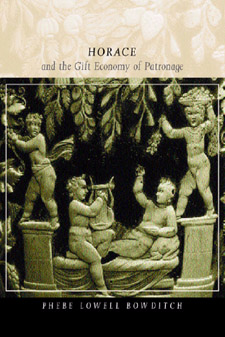 | Title: Horace and the gift economy of patronage Author: Bowditch, Phebe Lowell 1961- Published: University of California Press, 2001 Subjects: Classics | Classical Literature and Language | Poetry | Cultural Anthropology Publisher's Description: This innovative study explores selected odes and epistles by the late-first-century poet Horace in light of modern anthropological and literary theory. Phebe Lowell Bowditch looks in particular at how the relationship between Horace and his patron Maecenas is reflected in these poems' themes and rhetorical figures. Using anthropological studies on gift exchange, she uncovers an implicit economic dynamic in these poems and skillfully challenges standard views on literary patronage in this period. Horace and the Gift Economy of Patronage provides a striking new understanding of Horace's poems and the Roman system of patronage, and also demonstrates the relevance of New Historicist and Marxist critical paradigms for Roman studies. In addition to incorporating anthropological and sociological perspectives, Bowditch's theoretical approach makes use of concepts drawn from linguistics, deconstruction, and the work of Michel Foucault. She weaves together these ideas in an original approach to Horace's use of golden age imagery, his language concerning public gifts or munera, his metaphors of sacrifice, and the rhetoric of class and status found in these poems. Horace and the Gift Economy of Patronage represents an original approach to central issues and questions in the study of Latin literature, and sheds new light on our understanding of Roman society in general. [brief] Similar Items |
| 18. | 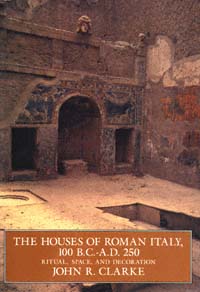 | Title: The houses of Roman Italy, 100 B.C.-A.D. 250: ritual, space, and decoration Author: Clarke, John R 1945- Published: University of California Press, 1992 Subjects: Classics | Art and Architecture | Architectural History | Art History Publisher's Description: In this richly illustrated book, art historian John R. Clarke helps us see the ancient Roman house "with Roman eyes." Clarke presents a range of houses, from tenements to villas, and shows us how enduring patterns of Roman wall decoration tellingly bear the cultural, religious, and social imprints of the people who lived with them.In case studies of seventeen excavated houses, Clarke guides us through four centuries of Roman wall painting, mosaic, and stucco decoration, from the period of the "Four Styles" (100 B.C. to A.D. 79) to the mid- third century. The First Style Samnite House shows its debt to public architecture in its clear integration of public and private spaces. The Villa of Oplontis asserts the extravagant social and cultural climate of the Second Style. Gemlike Third-Style rooms from the House of Lucretius Fronto reflect the refinement and elegance of Augustan tastes. The Vettii brothers' social climbing helps explain the overburdened Fourth-Style decoration of their famous house. And evidence of remodelling leads Clarke to conclude that the House of Jupiter and Ganymede became a gay hotel in the second century.In his emphasis on social and spiritual dimensions, Clarke offers a contribution to Roman art and architectural history that is both original and accessible to the general reader. The book's superb photographs not only support the author's findings but help to preserve an ancient legacy that is fast succumbing to modern deterioration resulting from pollution and vandalism. [brief] Similar Items |
| 19. | 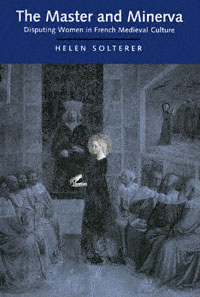 | Title: The master and Minerva: disputing women in French medieval culture Author: Solterer, Helen Published: University of California Press, 1995 Subjects: Literature | European Literature | Literary Theory and Criticism | Medieval Studies | Women's Studies | French Studies Publisher's Description: Can words do damage? For medieval culture, the answer was unambiguously yes. And as Helen Solterer contends, in French medieval culture the representation of women exemplified the use of injurious language.Solterer investigates the debates over women between masters and their disciples. Across a broad range of Old French literature to the early modern Querelle des femmes , she shows how the figure of the female respondent became an instrument for disputing the dominant models of representing women. The female respondent exploited the criterion of injurious language that so preoccupied medieval masters, and she charged master poets ethically and legally with libel. Solterer's work thus illuminates an early, decisive chapter in the history of defamation. [brief] Similar Items |
| 20. | 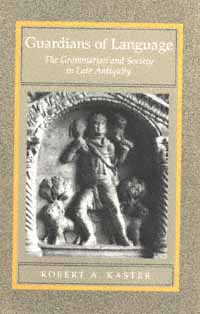 | Title: Guardians of language: the grammarian and society in late antiquity Author: Kaster, Robert A Published: University of California Press, 1997 Subjects: Classics | Classical Literature and Language | Language and Linguistics | Ancient History Publisher's Description: What did it mean to be a professional teacher in the prestigious "liberal schools" - the schools of grammar and rhetoric - in late antiquity? How can we account for the abiding prestige of these schools, which remained substantially unchanged in their methods and standing despite the political and religious changes that had taken place around them?The grammarian was a pivotal figure in the lives of the educated upper classes of late antiquity. Introducing his students to correct language and to the literature esteemed by long tradition, he began the education that confirmed his students' standing in a narrowly defined elite. His profession thus contributed to the social as well as cultural continuity of the Empire. The grammarian received honor - and criticism; the profession gave the grammarian a firm sense of cultural authority but also placed him in a position of genteel subordination within the elite.Robert A. Kaster provides the first thorough study of the place and function of these important but ambiguous figures. He also gives a detailed prosopography of the grammarians, and of the other "teachers of letters" below the level of rhetoric, from the middle of the third through the middle of the sixth century, which will provide a valuable research tool for other students of late-antique education. [brief] Similar Items |